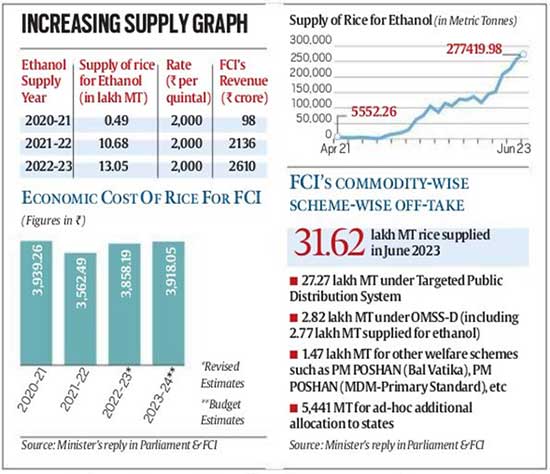Date : 28/07/2023
Relevance: GS Paper 3; Energy - Alternative fuel
Keywords: Food Corporation of India (FCI), Open Market Sale Scheme-Domestic (OMSS), Ethanol blending
Context-
- The production of ethanol from rice has witnessed a significant surge, as per the latest data available from the Food Corporation of India (FCI). In June 2023, a record high of 2.77 lakh metric tonnes of rice was supplied to distilleries for ethanol production, bringing the total quantity supplied in less than three years to an impressive 24 lakh tonnes.
- This surge in ethanol production has the potential to impact the energy landscape positively while addressing environmental concerns. However, this growth in ethanol supply comes amid certain restrictions placed on states regarding the purchase of FCI rice under the open market.
Rising Supply for Ethanol Production:
- The data reveals that in June 2023, the supply of rice for ethanol production saw a remarkable increase of 216% compared to the same month in 2022, reaching 2.77 lakh metric tonnes. Furthermore, the monthly supply of rice for ethanol was 2.95 lakh MT in May 2023, signifying a growing trend.
- The total quantity supplied for ethanol production since the Ethanol Supply Year 2020-21 has been steadily increasing, with the government intending to provide a total of 32 lakh MT of rice for ethanol during the Ethanol Supply Year 2022-23.
India's Initiatives Regarding Biofuels:
- Ethanol Blending Programme: 20% ethanol blending in petrol (E20) by 2025 (advanced from 2030). Already reached 10% ethanol blending with 400 crore liters of ethanol production.
- National Policy on Biofuels–2018: Aims for 20% ethanol blending under the Ethanol Blended Petrol (EBP) Programme by 2030.
- E-100 Pilot Project: TVS Apache two-wheelers designed to run on E80 or pure ethanol (E100).
- Pradhan Mantri JI-VAN Yojana, 2019: Create an ecosystem for commercial projects and boost Research and Development in the 2G Ethanol sector.
- Repurpose Used Cooking Oil (RUCO): FSSAI launched this program to collect and convert used cooking oil to biodiesel.
Ethanol as an Alternative Fuel:
- Ethanol, derived from rice and other renewable sources, is a promising alternative to conventional fossil fuels. It serves as a clean-burning and environmentally friendly option that helps reduce greenhouse gas emissions.
- The recent surge in ethanol production showcases the increasing interest in biofuels as a viable solution to combat climate change and reduce dependence on fossil fuels. It is in line with the Biofuel policy envisages an indicative target of blending 20% ethanol in petrol by 2025.
Impact on FCI and Revenue Generation:
- As per the data, the FCI has supplied over 24 lakh MT of rice for ethanol production since December 2020. This shift in supply has opened up new avenues for revenue generation, with the FCI generating a substantial Rs 4,844 crore from selling surplus rice for ethanol production.
Challenges and Restrictions:
- While the growth in ethanol production is promising, it is essential to consider the challenges and restrictions faced by states in procuring rice from the open market. Several states, including Karnataka, have expressed concerns about the discontinued sale of rice and wheat under the Open Market Sale Scheme-Domestic (OMSS) since June 13, 2023.
- This discontinuation has implications for the availability and pricing of essential commodities in the respective states.
Addressing Climate and Economic Concerns:
- The surge in ethanol supply for production aligns with the government's efforts to promote renewable energy sources and mitigate the impacts of climate change.
- Ethanol production not only reduces carbon emissions but also creates new economic opportunities for various sectors.
Conclusion:
The record-high supply of rice for ethanol production signifies a positive shift towards sustainable energy solutions in India. The rising interest in biofuels and the potential of ethanol to reduce carbon emissions hold significant implications for the environment and the economy. While the challenges faced by states in procuring rice under OMSS need attention, it is crucial to strike a balance between promoting ethanol production and ensuring food security for the nation. The continued efforts to harness the potential of renewable energy sources like ethanol will contribute to India's sustainable development goals and a greener future.
Probable Questions for UPSC main exam-
- What is the significance of the surge in ethanol production from rice in India, and how does it contribute to the country's energy landscape and environmental goals? (10 Marks, 150 words)
- Amidst the rising supply for ethanol production, what are the challenges faced by states regarding the purchase of rice from the open market, and how has this impacted the availability and pricing of essential commodities in the respective regions? (15 Marks, 250 Words)
Source : The Indian Express








